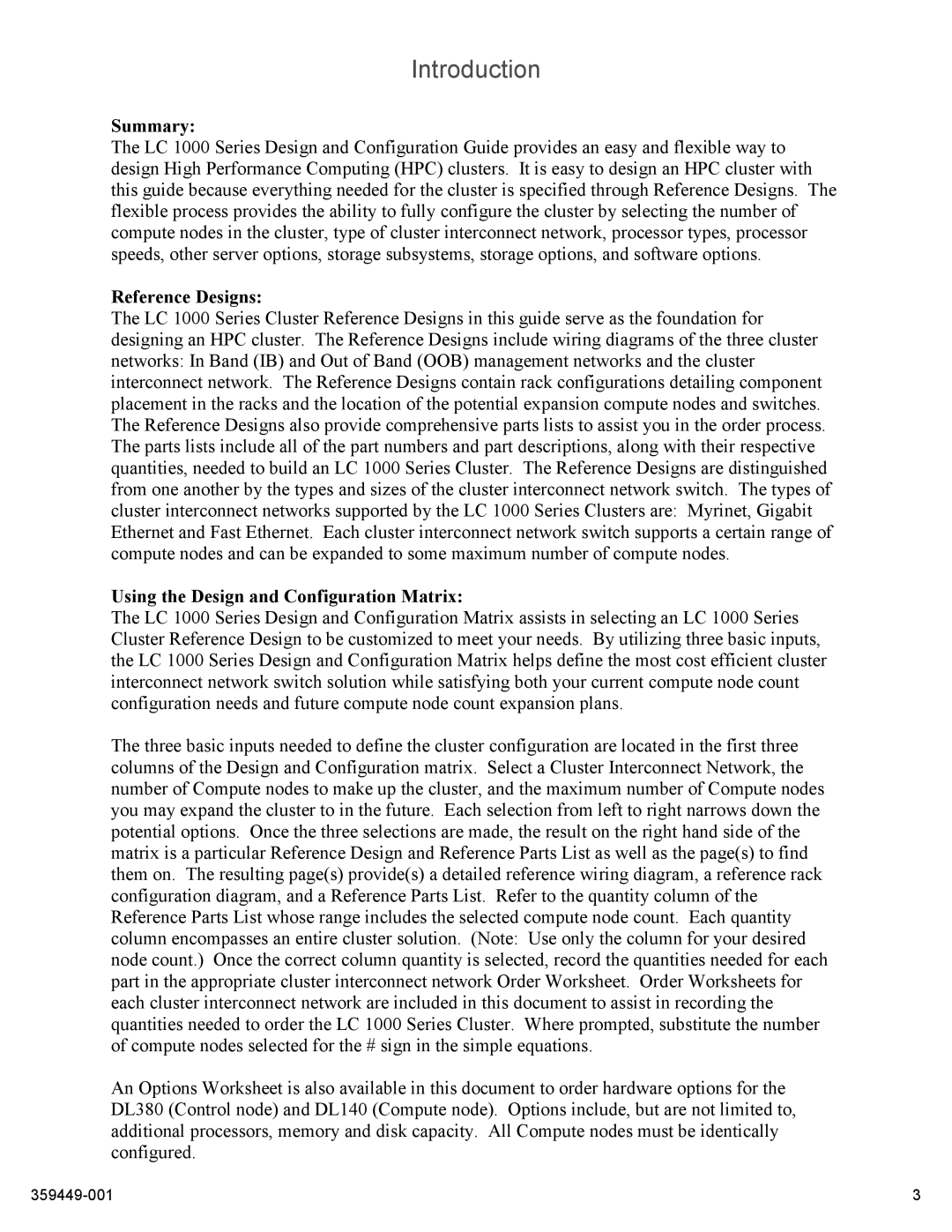Introduction
Summary:
The LC 1000 Series Design and Configuration Guide provides an easy and flexible way to design High Performance Computing (HPC) clusters. It is easy to design an HPC cluster with this guide because everything needed for the cluster is specified through Reference Designs. The flexible process provides the ability to fully configure the cluster by selecting the number of compute nodes in the cluster, type of cluster interconnect network, processor types, processor speeds, other server options, storage subsystems, storage options, and software options.
Reference Designs:
The LC 1000 Series Cluster Reference Designs in this guide serve as the foundation for designing an HPC cluster. The Reference Designs include wiring diagrams of the three cluster networks: In Band (IB) and Out of Band (OOB) management networks and the cluster interconnect network. The Reference Designs contain rack configurations detailing component placement in the racks and the location of the potential expansion compute nodes and switches. The Reference Designs also provide comprehensive parts lists to assist you in the order process. The parts lists include all of the part numbers and part descriptions, along with their respective quantities, needed to build an LC 1000 Series Cluster. The Reference Designs are distinguished from one another by the types and sizes of the cluster interconnect network switch. The types of cluster interconnect networks supported by the LC 1000 Series Clusters are: Myrinet, Gigabit Ethernet and Fast Ethernet. Each cluster interconnect network switch supports a certain range of compute nodes and can be expanded to some maximum number of compute nodes.
Using the Design and Configuration Matrix:
The LC 1000 Series Design and Configuration Matrix assists in selecting an LC 1000 Series Cluster Reference Design to be customized to meet your needs. By utilizing three basic inputs, the LC 1000 Series Design and Configuration Matrix helps define the most cost efficient cluster interconnect network switch solution while satisfying both your current compute node count configuration needs and future compute node count expansion plans.
The three basic inputs needed to define the cluster configuration are located in the first three columns of the Design and Configuration matrix. Select a Cluster Interconnect Network, the number of Compute nodes to make up the cluster, and the maximum number of Compute nodes you may expand the cluster to in the future. Each selection from left to right narrows down the potential options. Once the three selections are made, the result on the right hand side of the matrix is a particular Reference Design and Reference Parts List as well as the page(s) to find them on. The resulting page(s) provide(s) a detailed reference wiring diagram, a reference rack configuration diagram, and a Reference Parts List. Refer to the quantity column of the Reference Parts List whose range includes the selected compute node count. Each quantity column encompasses an entire cluster solution. (Note: Use only the column for your desired node count.) Once the correct column quantity is selected, record the quantities needed for each part in the appropriate cluster interconnect network Order Worksheet. Order Worksheets for each cluster interconnect network are included in this document to assist in recording the quantities needed to order the LC 1000 Series Cluster. Where prompted, substitute the number of compute nodes selected for the # sign in the simple equations.
An Options Worksheet is also available in this document to order hardware options for the DL380 (Control node) and DL140 (Compute node). Options include, but are not limited to, additional processors, memory and disk capacity. All Compute nodes must be identically configured.
| 3 |
